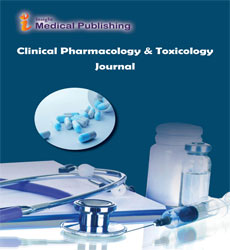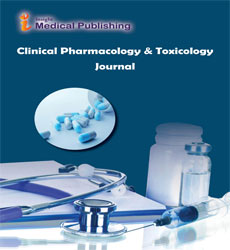Advances in Pharmacogenomics: Tailoring Therapy to Individual Patients
*Corresponding author:
Ephersyn Froeni,
Department of Allied Health Professions, Azienda Ospedaliero-Universitaria Careggi, 50134 Florence, Italy,
E-mail: Froeni.epher@unifi.it
Received date: February 01, 2025, Manuscript No. iprrt-25-20702; Editor assigned date: February 03, 2025, PreQC No. iprrt-25-20702 (PQ); Reviewed date: February 15, 2025, QC No. iprrt-25-20702; Revised date: February 22, 2025, Manuscript No. iprrt-25-20702 (R); Published date: February 28, 2025
Citation: Froeni E (2025) Advances in Pharmacogenomics: Tailoring Therapy to Individual Patients. Clin Phar Toxi Jour Vol.09 No.1:01
Introduction
Pharmacogenomics, the study of how an individualâ??s genetic makeup influences their response to drugs, represents a paradigm shift in personalized medicine. Traditionally, drug therapies have followed a â??one-size-fits-allâ?ÂÂ approach, which often results in variable efficacy, adverse drug reactions and suboptimal dosing. Advances in genomics and molecular biology have enabled the identification of genetic variants that affect drug metabolism, transport and target interaction. By integrating pharmacogenomic insights into clinical decision-making, therapies can be tailored to each patient, optimizing efficacy while minimizing toxicity. This approach is increasingly relevant in the management of cardiovascular disease, oncology, psychiatry, infectious diseases and chronic conditions, highlighting the potential of pharmacogenomics to transform healthcare into a more precise, safe and effective practice [1].
Description
The clinical application of pharmacogenomics relies on understanding the genetic determinants of drug response. Key areas of focus include polymorphisms in drug-metabolizing enzymes, transporters and receptors. CytoChrome P450 (CYP) enzymes, responsible for the metabolism of a large proportion of pharmaceuticals, are among the most studied. Genetic variations in CYP2D6, CYP2C9 and CYP2C19 significantly influence the metabolism of antidepressants, anticoagulants and proton pump inhibitors [2]. Patients with certain CYP2D6 polymorphisms may metabolize drugs too quickly or too slowly, resulting in therapeutic failure or adverse effects. Pharmacogenomic testing enables clinicians to adjust dosages or select alternative therapies based on an individualâ??s genotype, improving treatment outcomes. Transporter proteins, such as P-glycoprotein (encoded by ABCB1) and Organic Anion-Transporting Polypeptides (OATPs), also impact drug absorption, distribution and elimination. Variants in transporter genes can alter drug bioavailability and tissue distribution, affecting both efficacy and toxicity. For instance, polymorphisms in ABCB1 influence the pharmacokinetics of chemotherapeutic agents, immunosuppressants and antiviral drugs, guiding dose adjustments in clinical practice. By integrating genetic data on transporters with metabolic profiles, clinicians can predict drug levels more accurately and reduce adverse reactions.
Pharmacodynamic variability, determined by genetic differences in drug targets, is another critical aspect. Receptors, enzymes and ion channels exhibit polymorphisms that influence drug binding and response. For example, variants in VKORC1, the target of warfarin, affect sensitivity to anticoagulation therapy, necessitating genotype-guided dosing to avoid bleeding complications. In oncology, mutations in EGFR, BRAF, or HER2 predict responsiveness to targeted therapies, enabling precision treatment of cancers. Pharmacogenomics thus informs not only dosing but also the selection of the most appropriate therapeutic agents for individual patients.
Recent advances have extended pharmacogenomic applications beyond single-gene analyses to genome-wide approaches. Genome-Wide Association Studies (GWAS) identify novel loci associated with drug response, uncovering previously unrecognized mechanisms of interindividual variability. These discoveries enhance predictive models and broaden the spectrum of drugs amenable to genotype-guided therapy. Additionally, next-generation sequencing allows rapid and cost-effective profiling of multiple pharmacogenes simultaneously, facilitating comprehensive assessment of a patientâ??s pharmacogenomic landscape [1].
Integration of pharmacogenomic data into clinical decision-making has been accelerated by the development of guidelines and decision-support tools. Organizations such as the Clinical Pharmacogenetics Implementation Consortium (CPIC) and the Dutch Pharmacogenetics Working Group provide evidence-based recommendations for genotype-guided therapy. Electronic Health Records (EHRs) increasingly incorporate pharmacogenomic information, alerting clinicians to potential drug-gene interactions and guiding dosage adjustments in real-time. These tools bridge the gap between research and clinical practice, promoting the safe and effective implementation of personalized medicine. Pharmacogenomics has demonstrated significant impact in several therapeutic areas. In cardiovascular medicine, genotype-guided dosing of warfarin based on CYP2C9 and VKORC1 polymorphisms reduces the risk of bleeding and thromboembolic events. In psychiatry, CYP2D6 and CYP2C19 genotyping informs antidepressant selection and dosing, improving treatment response and reducing adverse effects. Oncology has benefited from pharmacogenomic insights in targeted therapy, where tumor-specific genetic profiles guide the use of kinase inhibitors, monoclonal antibodies and chemotherapeutic agents, enhancing efficacy while minimizing toxicity. In infectious diseases, pharmacogenomic data influence antiviral and antimalarial therapy, optimizing treatment outcomes and reducing drug resistance [2].
Conclusion
Advances in pharmacogenomics are transforming medicine by enabling therapies tailored to individual genetic profiles. Through the identification of genetic variants affecting drug metabolism, transport and targets, pharmacogenomics improves drug efficacy, reduces adverse effects and informs personalized therapeutic strategies. Genome-wide approaches, high-throughput sequencing and computational modeling are expanding the scope and precision of pharmacogenomic applications. Integration into clinical decision-making, supported by guidelines and electronic health records, is facilitating the translation of research into practice. While challenges remain, including the influence of non-genetic factors and ethical considerations, the continued development of pharmacogenomic tools promises to enhance patient care across multiple therapeutic areas. Ultimately, pharmacogenomics exemplifies the shift toward precision medicine, where treatments are no longer uniform but are carefully tailored to the molecular and genetic profile of each patient.
Acknowledgement
None.
Conflict of Interest
None.
References
- Thaker, J., Chhaya, J., Nuzhat, S., Mittal, R., Mansuri, A. P., & Kundu, R. (1996). Effects of chromium (VI) on some ion-dependent ATPases in gills, kidney and intestine of a coastal teleost Periophthalmus dipes. Tox 112: 237-244.
Google Scholar Cross Ref Indexed at
- Huddart, H., Greenwood, M. T., & Williams, A. J. (1974). The effect of some organophosphorous and organochlorine compounds on calcium uptake by sarcoplasmic reticulum isolated from insect and crustacean skeletal muscle. J Comp Phy 93: 139-150.

Open Access Journals
- Aquaculture & Veterinary Science
- Chemistry & Chemical Sciences
- Clinical Sciences
- Engineering
- General Science
- Genetics & Molecular Biology
- Health Care & Nursing
- Immunology & Microbiology
- Materials Science
- Mathematics & Physics
- Medical Sciences
- Neurology & Psychiatry
- Oncology & Cancer Science
- Pharmaceutical Sciences
